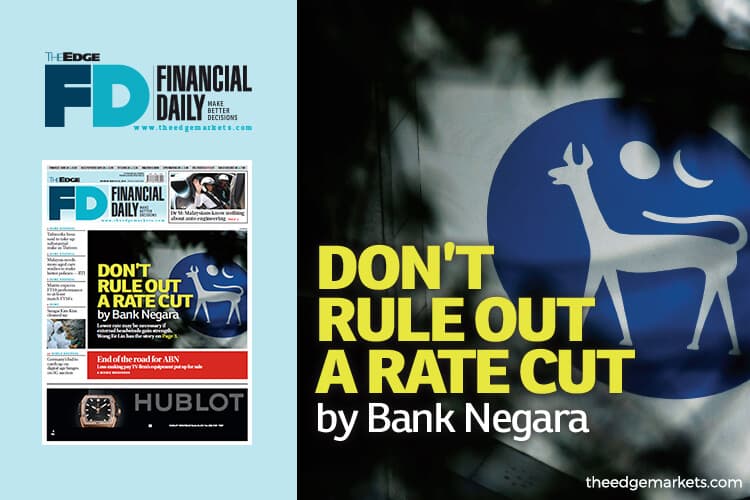
This article first appeared in The Edge Financial Daily on March 18, 2019
KUALA LUMPUR: While they are maintaining the view that Bank Negara Malaysia (BNM) is unlikely to cut the interest rate in 2019, economists are not ruling out the possibility that BNM may do so should the global economic growth slow further.
Talk of BNM might be cutting interest rate is gathering steam of late and that has put pressure on the ringgit which lost its strength last week. The ringgit has weakened to 4.089 against the US dollar from the 4.065-level in February.
An interest rate cut will be necessary to help sustain domestic economic growth when the outside world is in a rough patch.
Economists contacted by The Edge Financial Daily explained that the external factor, namely the world economy, could now be a key determinant of the direction of the overnight policy rate (OPR).
And that the prospects of the global economic growth, on the other hand, will very much dependent on whether the US and China can eventually resolve the trade dispute between these two world’s largest economies.
The OPR was last raised by 25 basis points in January last year in view of the steady domestic growth then.
“While our base case is for the OPR to remain unchanged at 3.25% for the rest of the year, we acknowledge that the odds of a 25 basis points cut have increased,” said UOB Malaysia senior economist Julia Goh.
Goh views that the latest monetary policy committee (MPC) statement signals that BNM is more cautious about the downside risks to growth, adding that this is in line with other central banks who have turned more dovish since February this year.
“The US Federal Reserve’s more supportive stance and strengthening of Asian foreign exchange amid the US dollar consolidation give regional central banks more flexibility to hold or ease policy rates,” she added.
Goh noted that external risks have risen and domestic sentiment is also muted, despite key data yet to show any signs of material weakness in the local economy.
Moreover, given the lower inflation trend across the region, policymakers do not have to hold interest rates high to prevent inflation from rearing its ugly head. Hence, Goh believes that some of the regional central banks may adjust their monetary policies to be more supportive of economic growth.
Affin Hwang Investment Bank Bhd chief economist Alan Tan is pinning hope on the US and China being able to resolve trade disputes next month.
“If the US and China come to a compromise, the global economic environment is expected to pick up in the second half of 2019 and this does not warrant BNM to cut interest rate,” said Tan.
However, assuming that the US decides to impose the tariff on China goods, from 10% to 25%, Tan believes that this will hurt the global economy. And BNM may have to relook at monetary policy stance.
Other than having the global trade tension to prolong into the second half of 2019, Tan concurs that lower inflation will also prompt BNM to cut the OPR.
In January, the country experienced deflation with the Consumer Price Index (CPI) dropping 0.7% year-on-year for the first time since November 2009 when the index fell 0.1%. The deflation was mainly caused by cheaper fuel.
Some quarters see the deflation rate as a sign that consumer spending is far from robust, although inflationary pressure is expected to rise as crude oil prices are heading higher.
The International Monetary Fund had forecasted Malaysia’s gross domestic product to grow at 4.7% in 2019, while it expects inflation to rise to above 2% in 2019, as the effect of the goods and services tax removal dissipates.
The new government is projecting a higher growth at 4.9% in 2019.
Noting that the economic fundamentals in Malaysia as healthy, Tan believes that the Malaysian economic growth will stay above 4.5% this year.
MIDF Research head of research Mohd Redza Abdul Rahman does not see the pressing need for BNM to trim interest rate.
He commented that the economy is still showing strong numbers; especially with stable food inflation, and with the overall deflation number seen, which was entirely from the lower RON95 prices .
Additionally, Mohd Redza said consumer spending is still strong looking at the recent distributive trade numbers where wholesale and retail sales were strong at RM52.9 billion and RM43.9 billion for January with year-on-year (y-o-y) gains of 6.2% and 10.6% respectively.
“The banking system also remains strong with January banking statistics showing a healthy 5.5% y-o-y loan growth with albeit the slowing trend seen for personal loans, mortgages and working capital. Therefore, there is no urgent need for a rate cut for now,” he added.